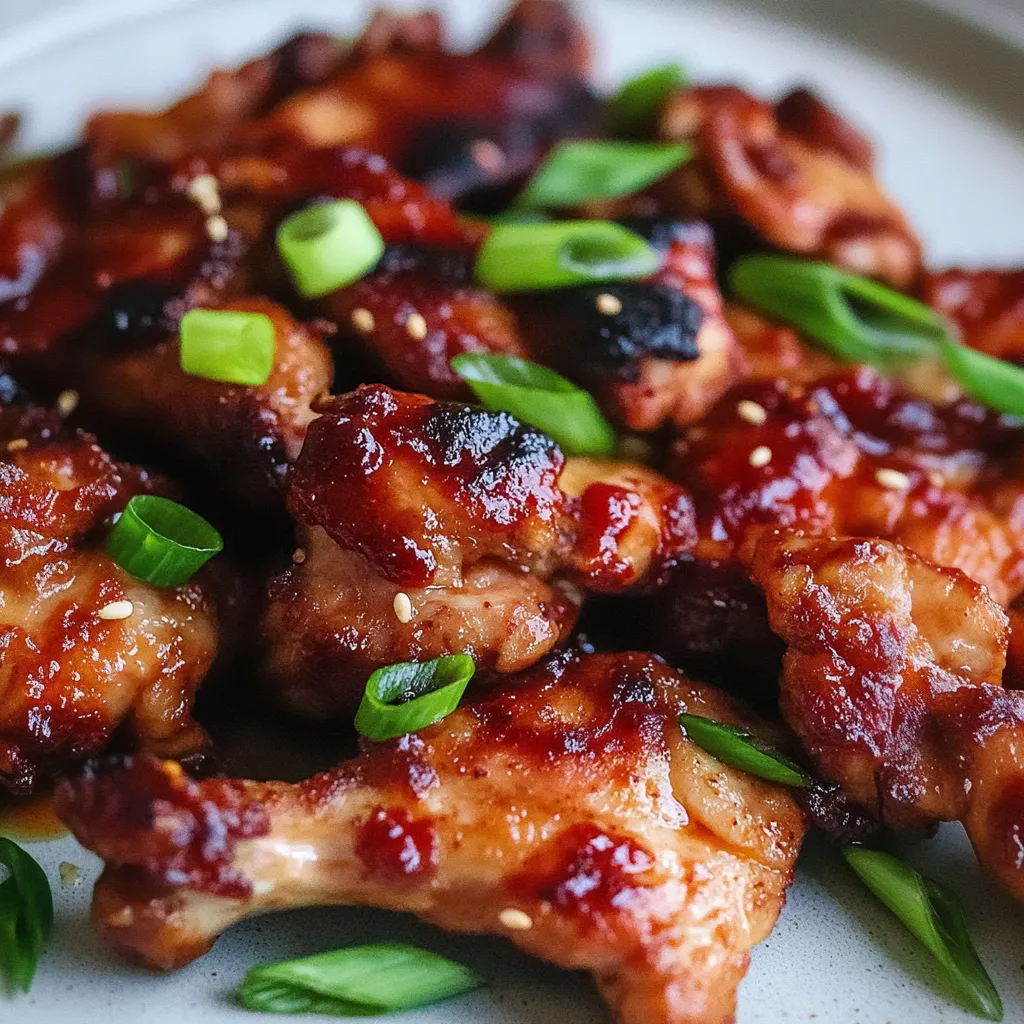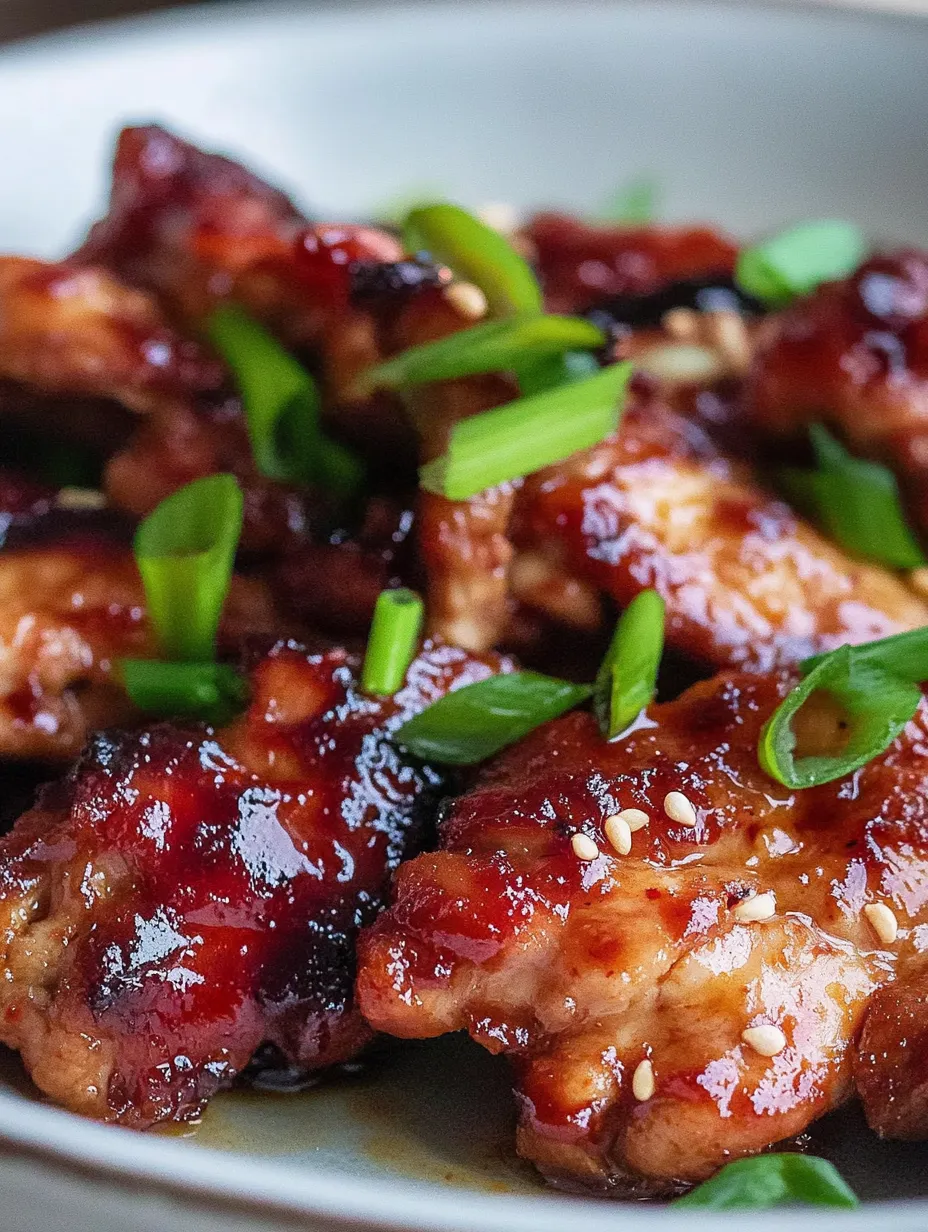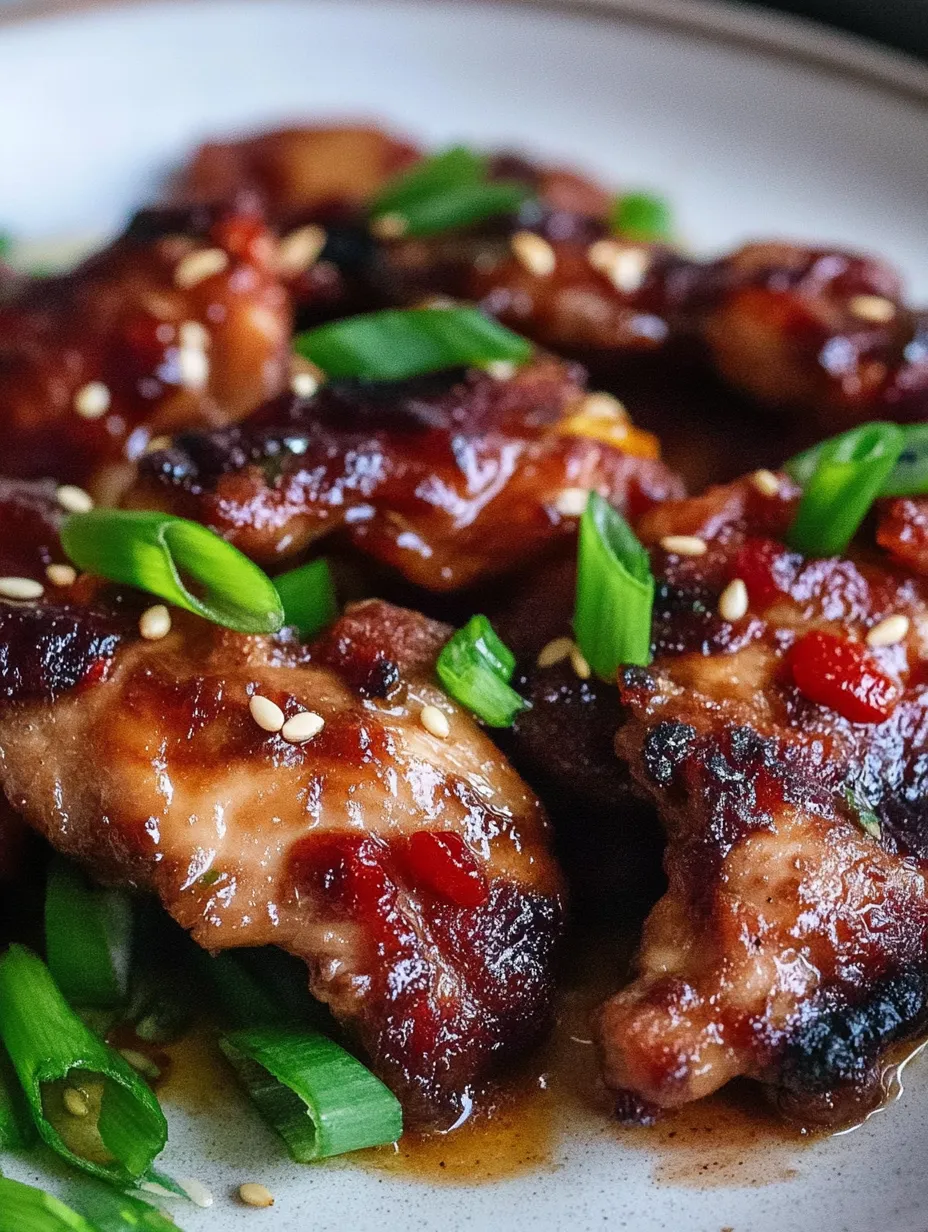 Pin it
Pin it
Juicy chicken thighs absorb vibrant Korean flavors in this simple yet incredibly satisfying take on traditional bulgogi that transforms ordinary poultry into something extraordinary. The perfect balance of sweet, savory and aromatic elements creates an irresistible glaze that caramelizes beautifully during cooking.
I stumbled upon this recipe during a particularly hectic month when I needed versatile proteins I could prep ahead and cook quickly. The first time I served this chicken bulgogi, my teenage son (who typically reserves compliments for pizza) asked if we could have it again the next night. The pear in the marinade creates such incredible tenderness while the combination of savory soy and sweet brown sugar develops beautiful caramelization when cooked.
Flavor Foundations
- Boneless chicken thighs: Provide perfect juiciness and tenderness while absorbing marinade beautifully
- Korean pear: Contains natural enzymes that tenderize meat while adding subtle sweetness
- Green onions: Contribute mild allium flavor and fresh color throughout the dish
- Soy sauce: Creates rich umami base that penetrates the meat completely
- Brown sugar: Balances savory elements while promoting beautiful caramelization
- Mirin: Adds complexity with its subtle sweetness and acidity
- Sesame oil: Delivers distinctive nutty aroma essential to Korean cuisine
- Fresh garlic: Infuses aromatic depth that permeates every bite
- Fresh ginger: Provides warming spice notes that complement the sweeter elements
- Gochujang: Optional Korean chili paste that introduces gentle heat and complexity
I've experimented with numerous versions of this marinade over the years, but always return to this specific balance of ingredients. The Korean pear is truly the secret weapon - I learned this trick from my neighbor's Korean mother who insisted it creates tenderness that no other ingredient can match. When I skip it, everyone notices the difference immediately.
Preparation Method
- Blend your base:
- Combine all marinade ingredients in blender until completely smooth for maximum flavor distribution.
- Prepare your protein:
- Trim chicken thighs of excess fat and ensure even thickness for consistent cooking results.
- Combine thoroughly:
- Place chicken in container with marinade, ensuring every surface is coated completely for maximum flavor.
- Allow flavor development:
- Refrigerate for minimum one hour, preferably overnight, allowing marinade to penetrate and tenderize.
- Choose cooking method:
- Select preparation style based on convenience and desired texture outcome.
- Air fryer approach:
- Cook in single layer with marinade at 385°F, turning periodically to develop caramelization on all surfaces.
- Stovetop technique:
- Sear chicken in hot skillet before adding remaining marinade to create glossy, flavorful sauce.
- Grilling strategy:
- Cook over moderate heat, basting occasionally with marinade to maintain moisture and develop flavor.
My favorite way to serve this chicken is actually the simplest - sliced over steamed rice with quick-pickled cucumbers on the side. The contrast between the warm, sweet-savory chicken and the cool, tangy cucumbers creates perfect balance. I've served this to guests countless times, and someone always asks for the recipe before leaving.
Perfect Pairings
Serve thinly sliced over rice with kimchi and a fried egg for a traditional Korean-inspired rice bowl that satisfies completely.
Wrap in lettuce leaves with rice, sliced cucumber and carrot for hand-held ssam-style eating that's perfect for casual gatherings.
Chop leftover chicken and toss with cold soba noodles, sesame dressing and julienned vegetables for an incredible next-day lunch.
Flavor Variations
Substitute equal parts gochujang for some of the brown sugar to create a spicier version with deeper complexity.
Add orange zest and a splash of orange juice to the marinade for citrus brightness that complements the sweetness beautifully.
Incorporate lemongrass and lime for a Southeast Asian twist that transforms the flavor profile completely.
 Pin it
Pin it
Storage Strategies
Refrigerate fully cooled leftover chicken in airtight containers with a small amount of cooking liquid to maintain moisture.
Freeze raw marinated chicken in individual portions for convenient future meals that require no additional preparation.
Convert leftover chicken into completely new meals by chopping and incorporating into fried rice, noodles or wraps.
What I appreciate most about this recipe is its incredible versatility. When I'm feeling energetic, I'll make a double batch and freeze half for those inevitable nights when cooking feels impossible. The marinade works its magic over time, meaning the frozen portion often turns out even more flavorful than the batch I cook immediately. This chicken bulgogi has become our family's definition of comfort food - deeply flavorful yet so straightforward that even my culinary-challenged husband can prepare it perfectly.
Meal Planning Magic
Create complete Korean-inspired meals by serving this chicken bulgogi as the centerpiece alongside traditional banchan (side dishes) for an authentic experience.
Plan your week by preparing a large batch on Sunday, then repurpose throughout the week in different presentations to avoid mealtime monotony.
Incorporate into grain bowls with varying vegetables and sauces to create entirely different meals from the same protein base.
Nutritional Benefits
This recipe delivers excellent protein content with moderate fat, creating satisfaction that prevents unhealthy snacking between meals.
The marinade contains ginger and garlic, both recognized for their anti-inflammatory properties and immune-supporting benefits.
When served with vegetables and whole grains, this creates a balanced meal with protein, complex carbohydrates, and essential micronutrients.
Family-Friendly Adjustments
For children sensitive to stronger flavors, reduce the amount of ginger and garlic slightly while maintaining the sweet-savory balance.
Create customizable family dinners by serving with various toppings and sides, allowing each person to build their perfect plate.
Involve older children in the marinating process as an educational cooking activity that teaches food science and flavor development.
International Adaptations
Transform leftover chicken into Korean-Mexican fusion tacos topped with kimchi slaw for an exciting culinary crossover.
Create Asian-inspired wraps using lavash bread, bulgogi chicken, and crisp vegetables for a portable lunch option.
Incorporate into grain-based salads with Mediterranean ingredients for an unexpected flavor combination that works surprisingly well.
 Pin it
Pin it
Environmental Considerations
Purchase chicken from local farms when possible, reducing carbon footprint while supporting sustainable agriculture.
Utilize reusable containers for marinating and storage rather than disposable plastic bags to minimize environmental impact.
Repurpose chicken bones (if using bone-in thighs) to make homemade stock, maximizing resource utilization and reducing waste.
Chef's Reflections
I've come to appreciate how this recipe demonstrates the beautiful simplicity at the heart of Korean home cooking - a handful of pantry staples transforms ordinary ingredients into something truly extraordinary. The balance of sweet, savory, and umami flavors has taught me valuable lessons about layering tastes that I've applied to countless other dishes in my cooking repertoire.
What began as a practical weeknight solution has become something of a signature dish in our home. Friends request it for gatherings, my children ask for it on their birthdays, and I find myself craving it after long days when I need something both comforting and exciting. There's something magical about a recipe that manages to be simultaneously special and everyday - this chicken bulgogi embodies that perfect balance.
Frequently Asked Questions
- → What can I substitute for Korean pear?
- If Korean pear isn't available, you can use a regular pear, apple, or even kiwi as they all contain enzymes that help tenderize the meat.
- → Can I use chicken breast instead of thighs?
- Yes, chicken breast works well too, but reduce the cooking time by a few minutes as it cooks faster and can dry out more easily than thighs.
- → What sides pair well with chicken bulgogi?
- Serve with steamed rice, kimchi, pickled vegetables, or wrapped in lettuce leaves for a traditional Korean meal.
- → Can I freeze the marinated chicken?
- Yes, you can freeze marinated chicken for up to 3 months. Thaw completely before cooking.
- → Is gochujang necessary for authentic flavor?
- Gochujang adds a spicy-sweet element but isn't essential. The dish is delicious even without it, just less spicy.
